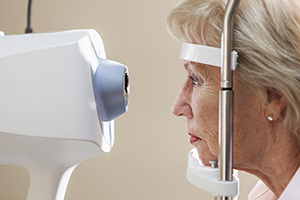Did you know that glaucoma is the second most common form of progressive blindness in the U.S., after macular degeneration? Or that it is the leading cause of blindness among African-Americans and Hispanics? In fact, glaucoma is estimated to affect over 4 million Americans—but only half of them know it.
Heralded by losses at the periphery of vision (the opposite of macular degeneration), once glaucoma has robbed a patient of vision it cannot be restored. So our best bulwark against blindness due to glaucoma is early detection, along with careful treatment and monitoring.
Glaucoma is associated with high intra-ocular pressure (IOP)—from a mechanistic standpoint, elevated pressure of vitreous fluid impinges on the optic nerve where it enters the eye. Optometrists and ophthalmologists routinely measure IOP when patients come in for eye exams, and medication can be given in the form of drops that lower pressure within the eyeball. If that fails, tiny holes can be drilled with precise laser surgery to create outlet channels in the trabecular mesh work of the eye to help drain the pent-up fluid.
But there’s more to glaucoma than just elevated IOP. “Normal pressure glaucoma” develops when the optic nerve shows signs of damage in the absence of high IOP. This implies that glaucoma may have a metabolic component, apart from the damaging effects of physical compression on the nerve ganglia that transmit light impulses from the eye to the brain.
When it comes to nutritional strategies, the likely implication is that there may be a two-fold strategy for glaucoma sufferers: 1) interventions that lower IOP and 2) interventions that prevent neurodegeneration of the optic nerve.
It has been acknowledged that some of the most prevalent subtypes of glaucoma are associated with metabolic syndrome, features of which are obesity and high blood pressure. Therefore, weight loss, exercise, sleep, and a low-carb diet, along with insulin-sensitizing nutrients—all of which help reverse metabolic syndrome—may be central to management of elevated IOP.
With regard to prevention of neurodegeneration, measures that can enhance circulation or support mitochondrial function within the neurons may be helpful. Traditional circulation boosters include fish oil, magnesium and ginkgo biloba. In fact, ginkgo has been shown to help restore visual fields in patients suffering from normal pressure glaucoma, and a recent scientific review proposed magnesium supplementation for glaucoma patients.
In an animal study, Omega 3 fatty acids were found to decrease IOP by promoting fluid outflow from the eye. When tested in humans, in combination with Vitamins B and E, DHA (docosahexanoic acid) has been shown to improve visual fields and retinal sensitivity in patients with glaucoma. In other studies, patients with glaucoma were found to have lower levels of omega 3 fatty acids than those without.
Much has been written about the potential for antioxidants to combat the neurodegeneration that is associated with loss of vision in glaucoma, but unlike macular degeneration (where comprehensive human trials have conclusively demonstrated the value of antioxidants), the use of antioxidants for glaucoma is less substantiated by clinical research in human subjects. Nevertheless, EGCG from green tea, known as a potent antioxidant, has demonstrated effectiveness in an animal model of glaucoma; Alpha lipoic acid has also been shown to limit glaucoma-related retinal ganglion cell death. Astaxanthin has demonstrated neuroprotective effects in the eye. Vitamins A, beta carotene and other carotenoids like lutein and zeaxanthin, C, and E and the minerals zinc and selenium have also been suggested to be beneficial.
When vision cells malfunction, likely culprits are the mitochondria, the powerhouses of energy-hungry photoreceptors in the eye. To this end, it is noteworthy that the latest research has revealed that nicotinamide (vitamin B3) can stave off vision loss in an animal model of glaucoma. It is thought that B3 acts a building block for NADH (nicotine adenine dinucleotide), a crucial energy compound. A more targeted approach might involve dosing with nicotinamide riboside (Tru Niagen Pro), a more direct precursor of NADH which has been demonstrated to raise NADH levels in human trials.
Patients ask me about Coleus forskohlii eyedrops, delivering 1% forskolin, which are safe and effective for glaucoma according to limited studies. But with the relatively effective prescription eye medicines that are available, I’m not sure that herbal eyedrops add much benefit, unless you’re intolerant to the other meds. Coleus may not work as well when taken orally, but a recent study showed that, when teamed with the potent bioflavonoid rutin, it could reduce IOP in patients poorly responsive to multi-drug therapy.
Along similar lines, a product (Myrtogenol) containing a mixture of pine bark extract (Pycnogenol) and bilberry was shown to reduce IOP and enhance ocular blood flow in subjects with glaucoma. This makes sense, because bioflavonoids, and in particular proanthocyanidins, are known for their ability to reduce venous and capillary leakage, and hence attenuate edema and fluid accumulation. Melatonin has been proposed as a free radical scavenger that may ameliorate glaucoma. Other studies have linked insufficient vitamin D to glaucoma, with the conclusion that “a low vitamin D level might render the optic nerve or its environment more vulnerable to glaucomatous insult.”
Finally, there is an herb that is particularly effective for lowering IOP: marijuana. Cannabis’ glaucoma-protective effects were first noted among ganja-smoking Jamaican Rastafarians, racially similar to African Americans in their genetic predisposition to glaucoma, but remarkably free of it.
It turns out that marijuana lowers IOP, and can be effective in ameliorating the debilitating headaches and eye pain experienced by sufferers of advanced, drug-refractory glaucoma. Moreover, new research suggests that marijuana compounds may be anti-inflammatory and neuroprotective. Some research suggests that cannabidiol (CBD) can deliver the glaucoma benefits of pot, but it’s not clear if it’s effective in the absence of THC, with its potential for “stoner” side effects.
So to summarize, if you have glaucoma:
- Optimize your weight
- Eat a low-carb diet to combat insulin resistance
- Exercise, but go easy on heavy weight-lifting or inversions which might increase intra-ocular pressure
- Don’t smoke!
- Get frequent eye checks, and remember to take your prescription eye drops
- If you’re taking an anti-hypertensive drug, particularly if you’re over 75, make sure that your medication isn’t causing your blood pressure to dip too low, especially at night while you sleep, which has been demonstrated to impair circulation to your eyes and worsen glaucoma.
- Don’t overdo it on coffee or decongestant ingredients in cold or allergy medications; bladder medications, antihistamines, oral steroids and steroid eye drops, and certain antidepressants have also been associated with glaucoma worsening.
- Take a good Omega 3 supplement
- Take chelated magnesium
- Take antioxidants (mixed carotenoids, vitamins A, C, mixed tocopherol E, zinc, selenium, alpha lipoic acid, lutein, zeaxanthin, and possibly astaxanthin)
- Take ginkgo biloba standardized extract (40 mg 3 times daily was used in the study)
- Take EGCG capsules (one twice daily) or drink several cups of green tea daily
- Take Tru Niagen Pro 500 mg twice daily
- Consider a potent bioflavonoid or proanthocyanidin (rutin, grape seed extract, bilberry, and/or pycnogenol) formula
- Take melatonin 3-5 mg at bedtime
- Make sure your serum 25(OH) vitamin D is 40 ng/ml or greater
- Consider marijuana derivatives under the guidance of a health practitioner experienced with cannabinoid prescribing.








